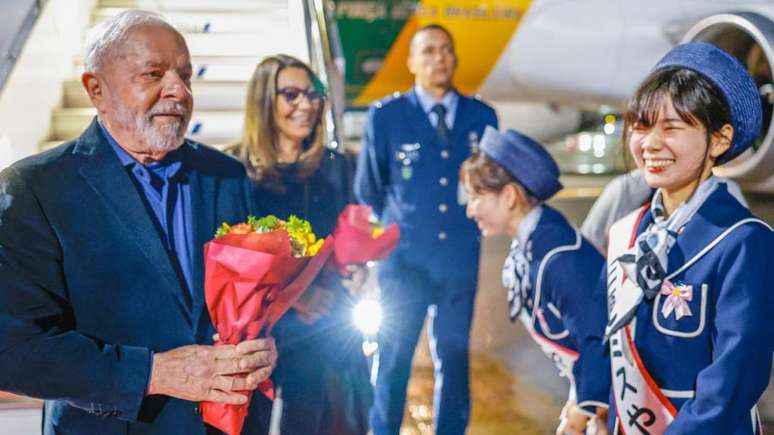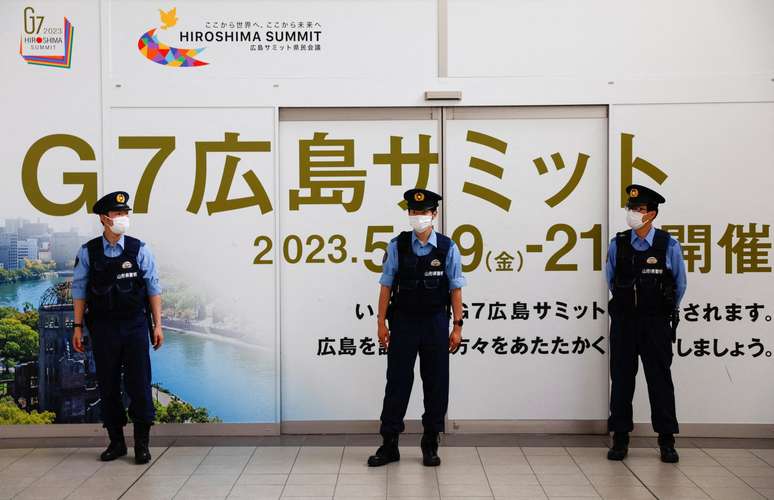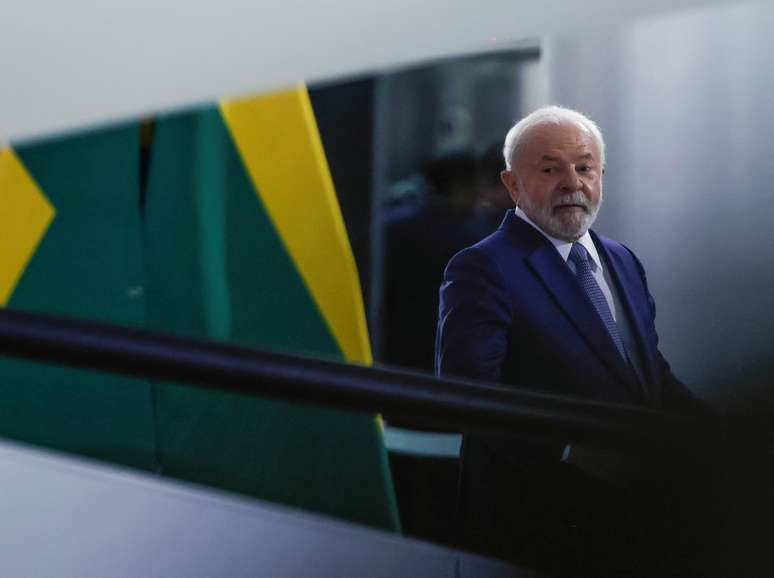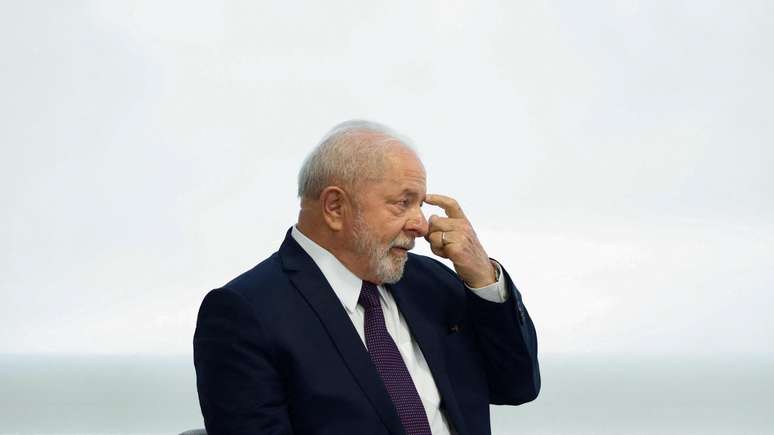Returning to G7 meetings after 14 years without participation, the Brazilian government will try to help neighbors renegotiate a loan with the IMF, which could signal Brazil’s commitment to use its niche in global politics to defend the interests of the region.
President Luiz Inácio Lula da Silva (PT) landed this Friday (May 19) in Hiroshima, Japan, to attend the G7 meeting, a group made up of Canada, the United Kingdom, Japan, the United States, Italy, Germany and France .
It will be the first time in 14 years that a Brazilian representative will participate in G7 meetings. Eight nations have been invited this year: India, Indonesia, Australia, the Cook Islands, Comoros, South Korea, Vietnam, as well as Brazil.
In front of the leaders of the seven most industrialized nations in the world, Lula intends to expose a historical problem well known to Brazilians: the economic crisis in Argentina.
With inflation approaching 110% a year, interest rates at 97% a year, dollar reserves at their lowest level since 2016 (and which some analysts are already considering negative in practice) and the heavily devalued peso, Argentina has recently faced the worst drought in 94 years (which also affected the southern region of Brazil), which has disrupted the cultivation of corn and soybeans in the country.
The catastrophic scenario – in an election year – led Argentine President Alberto Fernandez to pay an emergency visit to Brasilia two weeks ago, to ask for financial help.
“In fact, right now, Argentina already has debts of more than $1 billion, it’s already in the red. It is evident that the loss of export earnings due to the drought has had violent effects, but the problem has already come from before, a situation in which the Central Bank of Argentina will literally soon have to declare itself unable to disburse dollars to finance services. It is a situation of a moratorium of weeks, months. What is happening now is very similar to the 2001 scenario, “he says the economist Otaviano Canuto.
In this speech, the former World Bank vice president and senior member of the Policy Center for the New Global South refers to Corralito, the latest major crisis in the neighboring country that has resulted in a package of measures to prevent bank runs.

Faced with this situation, Lula has made it one of his priorities in meetings with G7 leaders to try to help Argentina renegotiate the terms of the $44.5 billion loan it took out with the International Monetary Fund (IMF) in 2018.
Concerned with issues such as the US-China dispute, food security, supply chains, global warming and the war in Ukraine, G7 members do not have Argentina’s economic crisis among their priorities.
However, according to Lula’s advisers, the president’s rationale for trying to get the agenda is simple: “if they (G7) want to discuss Ukraine, we want to discuss Argentina, these are the priorities.”
Pressure on shareholders
With the exception of Canada, the other six G7 members are among the ten largest lenders to the IMF (Brazil is currently the bank’s tenth largest shareholder and India, which will also be present, is the ninth).
According to sources interviewed by BBC News Brasil at the Ministry of Planning, the Treasury and the Planalto Palace, Argentines have asked and Lula agreed to take the request to the top for the IMF to tighten the fiscal targets of the current flexible loan agreement – that Argentina will not be able to meet – and that it accepts advance transfers of around R $ 80 billion, which should be disbursed by December by the Fund if the goals are achieved by the Fernandez government.
In a recent visit to China, Lula had already mentioned the case of Argentina and the IMF to criticize the multilateral banks and praise the New Development Bank (NDB), or bank of the BRICS, currently chaired by former president Dilma Rousseff.
“Banks must be patient. If necessary, renew the agreement and put the word tolerance in each renewal because it is not up to the bank to suffocate the countries’ economies, as the International Monetary Fund is doing now with Argentina,” Lula said . . .
Even before Lula’s arrival in Japan, it was up to Finance Minister Fernando Haddad to address the question of Argentina in the G7 Finance with at least three of his counterparts, in the course of bilateral meetings.

The minister tried to “raise awareness” of US Treasury Secretary Janet Yellen, Japanese Economy Minister Yasutoshi Nishimura and Indian Finance Minister Nirmala Sitharaman.
Haddad justified the mediation on the basis of immediate Brazilian interests: along with China, Brazil is Argentina’s largest trading partner and has a trade surplus with its neighbors.
Economists estimate, however, that no matter how bad Argentina’s crisis is, a “contagion effect” on the region’s economy is unlikely.
When questioned on the subject by Bbc News Brasil, US diplomats said they were aware of Lula’s “criticisms” of the multilateral banks in Washington, but avoided taking a position on Argentina’s new request: the US represents almost 17% of the capital of the IMF.
Publicly, the IMF says it maintains “constructive discussions” with Argentine officials and does not discuss the terms of the agreement, which are confidential. But in the financial market, the perception is that there is little sympathy for the Argentine election.
Recently, the Argentine newspaper La Nación quoted fund sources who say they fear the electoral use of a possible advance — Fernandez has just announced that he will not run again.
At the Ministry of Finance and Planning in Brazil, the understanding is that the provision of the Fund “is not the best”. But that government pressure could destabilize Brazil’s current representative on the executive committee, Afonso Bevilaqua, in office from the Bolsonaro administration.
“This request from Argentina would only be possible if the big shareholders wanted and decided to give additional funds, without guarantees. I don’t see it as justifiable (Argentina’s request), as far as it is viable by the IMF rules. After all, what the government of Argentina is trying to do nothing but push an unsustainable situation with its belly,” says Canuto.
Regional and global leader

While he has little chance of success in easing Argentina’s financial situation, Lula’s taking up the country’s cause with global leaders is yet another attempt to exploit Brazil’s stature both regionally and globally.
For the countries of the Southern Cone, it would signal the country’s commitment to use its privileged spaces in global politics in defense of regional interests. For global leaders, it would demonstrate that Brazil doesn’t just speak for itself, but represents a group of nations who see it as a leader.
The perception in the Lula government, according to the advisers, is that this would be another opportunity to show that “Brazil is back”.
According to the professor of international relations of the Federal University of Minas Gerais (UFMG), Dawisson Belém Lopes, the Lula government began by “accelerating” a foreign policy that, in fact, it has been adopting for decades.
“Brazil and Argentina have been diplomatic allies since the 1970s and 1980s with Itaipu, passing through Mercosur and arriving today at forums such as the G20 and even the UN Security Council which, now that Brazil is a non-permanent member , opens space for Argentina, Chile and other South American allies in this effort to galvanize support and become a leader in their region, and ultimately in Latin America and the Caribbean,” says Belém Lopes.
“In the context of the G20, Brazil’s great ally is Argentina. There is a composition of interests whose main objective, of course, is to join forces in order to be able to apply pressure, to be able to guide the meetings and give greater attention to the points of view of the Global South”.
The four years of the Bolsonaro administration represented a break in this foreign policy. But also in January, during his first official visit to Argentina and Uruguay, Lula expressed his intention to reverse course and focus once again on Mercosur.
In Itamaraty, the understanding is that this type of agenda is also important to clarify that Brazil does not see itself and does not want to be treated only as an environmental leader. Brazil will assume the presidency of the G20 next December and, as leader of the bloc, has called on Paraguay and Mercosur partners Uruguay to act as invited members of the bloc.
In this context, a notable absence in the discussions proposed by Brazil in the G7 must be the Mercosur-European Union trade agreement. Treated as a priority during Lula’s campaign, which criticized Bolsonaro for failing to carry out the deal due to environmental issues, the text has become a bone of contention within the PT government.
The content of a letter sent by the European Union with environmental demands did not go along with the region’s leaders.
In the Brazilian federal administration, departments such as Finance, Planning and the Ministry of Development, Industry, Commerce and Services believe that it is possible to respond to Europeans in the same tone through diplomatic channels, without the need to reopen the terms of the already approved convention.
The other party, mainly represented by Civil House, sees unacceptable terms in the terms of the letter and the agreement itself. Faced with the tug of war of the leadership, Lula has begun to avoid very assertive comments on the agreement between Mercosur and the European Union and a definitive position of the president should be taken only after his return to Japan. During the finance G7, Haddad did not address the issue.
Belém Lopes proposes a possible explanation of the apparent paradox of the Brazilian silence on the Mercosur-European Union agreement in such a privileged forum.
“Without going into the merits of whether it is good or bad, I think it is understandable (the position of the Lula government). Brazil wants to lead its region, it is clear that regaining regional leadership is a priority. An initiative such as the European Union-Mercosur Bi-Regional could eventually dilute this Brazilian ability to lead its region, especially if the deal is not perceived as good for Brazil or for sectors of the Brazilian economy, industry brazilian. .
Source: Terra
Rose James is a Gossipify movie and series reviewer known for her in-depth analysis and unique perspective on the latest releases. With a background in film studies, she provides engaging and informative reviews, and keeps readers up to date with industry trends and emerging talents.







